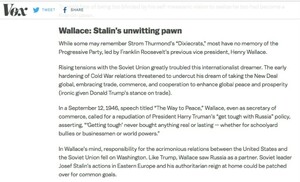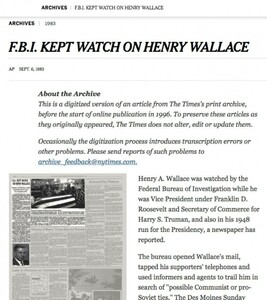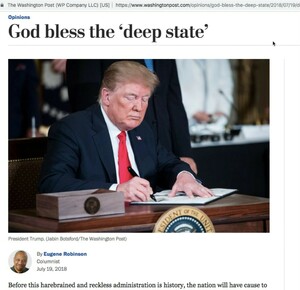The FBI’s Investigation of Trump as a “National Security Threat” is Itself a Serious Danger. But J. Edgar Hoover Pioneered the Tactic
To this very day, many of the same people who accuse Trump of being a Kremlin pawn still accuse Wallace of being the same thing, often for the same reasons. In October, 2016, Vox published an accusatory article about Henry Wallace by Will Moreland of the Brookings Institution designed to compare him to Trump when it came to potentially treasonous servitude toward Russia.
Moreland claimed that Wallace “shares Trump’s fate of being too blinded by his self-messianic vision to realize he too had become a Kremlin pawn.” To justify this accusation, Moreland – citing Wallace’s 1946 pro-peace speech – explicitly compared Trump’s desire for better relations with Moscow to Wallace’s similar desire and used it to claim that both Wallace and Trump were Kremlin stooges and assets, whether “witting” or otherwise. In Vox, Moreland wrote:
In Wallace’s mind, responsibility for the acrimonious relations between the United States and the Soviet Union fell on Washington. Like Trump, Wallace saw Russia as a partner. Soviet leader Josef Stalin’s actions in Eastern Europe and his authoritarian reign at home could be patched over for common goals. . . .
As Howard Norton of the Baltimore Sun reported at the time, there emerged “a growing and spreading conviction among New Dealers and other ‘liberals’ that Wallace, wittingly or unwittingly, is playing Moscow’s game and is hurting rather than helping the cause of peace.”
Wallace was unwitting, at least vis-à-vis the larger agenda behind Stalin’s endorsement. As with Trump today, the Kremlin was adroitly manipulating Wallace. . . . It is a time for engagement, not retrenchment, and for a leader with the judgment to recognize friends from adversaries — a judgment Donald Trump, like Henry Wallace before him, clearly lacks.
That the FBI conducted an extensive counterintelligence investigation of Wallace was unknown until 1983 – eighteen years after his death. Citing reporting by the Des Moines Register, the New York Times explained that “Wallace was watched by the Federal Bureau of Investigation while he was Vice President under Franklin D. Roosevelt and Secretary of Commerce for Harry S. Truman, and also in his 1948 run for the Presidency” and that “the bureau opened Wallace’s mail, tapped his supporters’ telephones and used informers and agents to trail him in search of ”possible Communist or pro-Soviet ties.'”
Even decades later, the FBI still refuses to release all of its investigative files on Wallace; as FOIA warrior Emma Best noted last night, the FBI “is still fighting to not release the files.” But many of the files are now declassified and online, and one can read the voluminous tracking by FBI agents of Wallace’s movements during the time he was the elected Vice President of the United States – all because his dissenting, pro-peace views on Russia made his patriotism suspect in the eyes of Hoover and his agents.
For decades, the FBI also maintained a massive dossier on long-time liberal Senator and 1972 Democratic presidential nominee George McGovern – first because he was suspected of Kremlin sympathies and then because he was a critic of the FBI. Among other things, the FBI, while relentlessly tracking his life, discovered that McGovern had fathered a child out of wedlock, and in the words of USA Today, “somehow, the material ended up with President Richard Nixon’s re-election campaign – possibly leaked by the bureau’s longtime director, J. Edgar Hoover.”
It is not difficult to understand what is so ominous and even tyrannical about the FBI investigating domestic political figures whose loyalties they regard as “suspicious,” and whose political career they regard as a “national security threat,” simply because those politicians express policy positions about U.S. adversaries that the FBI dislikes or regards as insufficiently belligerent.
It’s the FBI’s job to investigate possible crimes under the law or infiltration by foreign powers, not ideological sins. If a politician adopts policy views that are “threatening” to U.S. national security or which is unduly accommodating to America’s adversaries or “enemies,” that’s not a crime and the FBI thus has no business using its vast investigative powers against a politician who does that.
That’s why it’s so easy to see that Hoover’s investigative scrutiny of Henry Wallace, and George McGovern, and an endless array of domestic dissenters, was so anti-democratic and dangerous. If a politician adopts “threatening” policy views or is too subservient toward or accommodating of a foreign adversary, it’s the job of the American voting public or Congress in its political oversight and lawmaking role to take action, not the FBI’s job to criminalize policy differences through investigations.
It should not be difficult for a rational brain free of partisan muck to see this same principle at play when it comes to the FBI’s investigation of Trump on the ground that he may be, in the eyes of FBI officials, a “national security threat.” Even if you’re someone who hates Trump’s overtures toward Russia or even believes that they are the by-product of excessive subservience to the Kremlin, the dangers of having the FBI take on the role of investigating that rather than the political wings of the U.S. political system should be obvious – as obvious as they are in the case of Henry Wallace and George McGovern.
Obviously, if there is reason to suspect that actual crimes have been committed – such as, say, Trump officials collaborating with Russia to hack into email inboxes or otherwise engaging in illegal deals with foreign powers – then it’s not just permissible but vital that the FBI investigate such allegations.
That’s why I’ve been a vigorous defender from the start of having a full-scale investigation into those allegations with the evidence publicly disclosed: so that we can know what happened rather than relying on self-serving, evidence-free, anonymous leak snippets laundered through MSNBC and the Washington Post. As I wrote in March, 2017 about Trump/Russia claims: “A formal, credible investigation into all these questions, where the evidence is publicly disclosed, is still urgently needed.”
But the FBI investigation revealed by the New York Times is separate from the Mueller investigation or even questions of collusion. It’s clearly based, at least in part, on the FBI’s disagreements with Trump’s foreign policy views and the agency’s assessment that such policies fail to safeguard “U.S. interests” as the FBI defines them. The NYT notes that among the events that prompted the investigation were that Trump “refused to criticize Russia on the campaign trail,” that the GOP “softened its convention platform on the Ukraine crisis in a way that seemed to benefit Russia,” and that Trump decided to fire the FBI’s director, Jim Comey.
The NYT article is clear that at least some of the agents involved in this investigation, including the former FBI lawyer Lisa Page, vigorously disagreed with Trump’s view of Russia that it is less of a threat than many in Washington believed (a view which the Vox article identified as making Trump similar to Henry Wallace):
Many involved in the case viewed Russia as the chief threat to American democratic values.
“With respect to Western ideals and who it is and what it is we stand for as Americans, Russia poses the most dangerous threat to that way of life,” Ms. Page told investigators for a joint House Judiciary and Oversight Committee investigation into Moscow’s election interference.
The person elected by the U.S. electorate to make foreign policy for the United States and to determine “America’s interests” was Donald Trump, not the FBI. It’s the role of elected officials in the White House and Congress, not the unelected police agents who report to them, to decide what is and is not in “America’s interests.”
If Trump’s foreign policy is misguided or “threatening,” that’s a matter for the Congress and/or the American public, not the FBI. However “threatening” one regards Trump’s foreign policy relating to Russia, the FBI’s abuse of its powers to investigate an elected official due to disagreement with his ideology or foreign policy views is at least as dangerous, if not more so, and the fact that those policy disagreements are characterized as “national security threats” does not make those actions any less threatening or abusive – whether for Trump, Henry Wallace or George McGovern.
It’s certainly possible, as the always-smart Harvard Law Professor and former Bush DOJ official Jack Goldsmith wrote at Lawfare, that the FBI had far more grounds that is currently known for opening this investigation. But based on what we do know, Goldsmith adeptly argues, there is a potentially disturbing incident of serious overreach of the FBI’s role and grave abuse of its vast investigative powers. While Goldsmith is clear that he is not yet adopting this view – in part because some facts are unknown and in part because the Constitutional issues are murky – he lays out what the potential dangers are (emphasis added):
The reason the FBI step might have been imprudent is that it was premised on an inversion of the normal assumptions of Article II of the Constitution. . . .
It is not unusual for a president to make controversial policy decisions that could, in some quarters, be viewed as causing harm to the national security interests of the United States. For example, many saw George W. Bush’s decisions in the war on terrorism, or Barack Obama’s rapprochement with Iran and Cuba, as harming U.S. national security. Many believe that most of Trump’s foreign policy constitutes a similar threat—his attacks on allies and international institutions, his lies and erratic behavior, and the like. But the FBI obviously would not open a counterintelligence investigation for these matters.
They would not do so because these actions—and indeed the very determination of the U.S. interest in the conduct of U.S. foreign policy—are presidential prerogatives. . . . Because the president determines the U.S. national security interest and threats against it, at least for the executive branch, there is an argument that it makes no sense for the FBI to open a counterintelligence case against the president premised on his being a threat to the national security. The president defines what a national security threat is, and thus any action by him cannot be such a threat, at least not for purposes of opening a counterintelligence investigation. . . .
The FBI cannot act in a way that is legally premised on second-guessing the president’s national security bona fides. On this view, the FBI can fully investigate Russia’s interference with the 2016 election, including matters involving the president, as it has been doing for a while now. But it cannot cross the line of taking investigative steps premised on the president’s threat to national security. The Constitution leaves crossing that line up to Congress and the American people. . . .
First, presidents and their delegates all the time engage in controversial contacts with foreign leaders and with their intelligence agents that sharply change the direction of U.S. foreign policy concerning matters that some critics believe shows undue fealty towards a foreign power. Think of some critics’ view of Nixon’s opening with China or, again, of Obama’s with Iran and Cuba. Or imagine that Rep. Tulsi Gabbard is elected in 2020 and brings controversial foreign policy views to the presidency.
One danger in the what the FBI apparently did is that it implies that the unelected domestic intelligence bureaucracy holds itself as the ultimate arbiter—over and above the elected president who is the constitutional face of U.S. intelligence and national security authority—about what actions do and don’t serve the national security interests of the United States. It further suggests that the FBI claims the authority to take this step on the basis of the president’s exercise of another clear presidential prerogative—the firing of the FBI director in connection with the Russia investigation, which the Times says was the final predicate for the FBI’s action. . . .
[A]t one time, under J. Edgar Hoover, it secretly collected intelligence information on the president and other elected officials and used that secret information to influence the behavior of those officials. This is an ever-present danger with any intelligence bureaucracy in a democracy. A second adverse effect of the FBI’s counterintelligence investigation of the president is that it gives credence to these types of concerns about the contemporary FBI—especially if the FBI opened a counterintelligence file on the president and did not notify him, as I suspect happened in the Trump case. . . .
As I have noted many times, one of President Trump’s most nefarious skills is to act in norm-busting ways that cause people and institutions to respond to him in norm-busting ways. If indeed the FBI took the unprecedented step of opening a counterintelligence investigation directed at the president premised on his threat to national security, I hope the bureau had much stronger evidence for doing so than the Times story provided—and I hope that something of investigative substance actually turned on it. Otherwise, the step strikes me as deeply imprudent.
This argument, and the entire affair, underscores two crucial paradoxes of the Trump era. The first is that our discourse manically shifts from the claim that only maniacal and conspiratorial losers believe that there is such a thing as a “Deep State” in the glorious democracy of the United States, to prayers that the Deep State save us from Trump, and then back again. The core attribute of a Deep State is, to use Goldsmith’s words for what may have happened here, an “unelected domestic intelligence bureaucracy holds itself as the ultimate arbiter—over and above the elected president who is the constitutional face of U.S. intelligence and national security authority—about what actions do and don’t serve the national security interests of the United States.” Such a state of affairs is at least as dangerous for U.S. democracy as anything Trump is doing with Russia.
The second paradox is the one Goldsmith so perfectly described: “one of President Trump’s most nefarious skills is to act in norm-busting ways that cause people and institutions to respond to him in norm-busting ways.”
It was a dangerous and shameful moment when J. Edgar Hoover investigated U.S. politicians as potential traitors and stooges because he believed they were too deferential and subservient to Russia, or because their advocated plans for peace with Moscow were “contrary to American interests.” It’s no better when the agency housed in the headquarters that, revealingly, still bears Hoover’s name does the same today.





